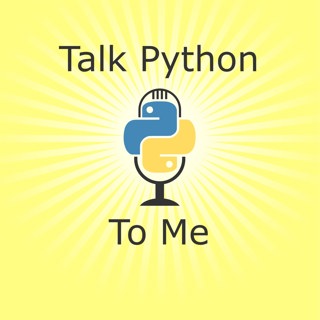
#370: OpenBB: Python's Open-source Investment Platform
You may have heard of the Bloomberg terminal. It's expensive software that can monitor and analyze real-time financial market data and place trades on the electronic trading platform. But have you heard of OpenBB? It's similar software for real-time and long term analysis for finance and investing. The difference is it's open source and built entirely with Python and gives you access to analyze a massive amount of real-time and historical data using the full Python data science stack. On this episode, we have one of the cofounders, James Maslek here to give us a look inside this cool piece of Python-based software.
22 Kesä 202254min

#369: Getting Lazy with Python Imports and PEP 690
Python is undergoing a performance renaissance. We already have Python 3.11 20-40% faster than even Python 3.10. On this episode, we'll dive into a new proposal to make Python even more efficient using lazy imports laid out in PEP 690. We have all three folks involved on the episode: Carl Meyer, Germán Méndez Bravo, and Barry Warsaw. Are you ready to get into making Python faster still? Let's dive in.
16 Kesä 202256min

#368: End-to-End Web Testing with Playwright
How do you test whether your web sites are working well? Unit tests are great. But for web apps, the number of pieces that have to click together "just so" are many. You have databases, server code (such as a Flask app), server templates (Jinja for example), CSS, Javascript, and even deployment topologies (think nginx + uvicorn). Unit tests won't cover all of that integration. But Playwright does. Playwright is a modern, Pythonic take on testing webs apps using code driving a browser core to interact with web apps the way real users and API clients do. I think you'll find a lot to like there. And we have Pandy Knight from Automation Panda here to break it down for us.
3 Kesä 20221h 13min

#367: Say Hello to PyScript (WebAssembly Python)
Despite Python being overwhelmingly popular and positive, there are major areas of computing where Python is not present. Most notably on mobile and on the frontend side of the web. PyScript, a new project launched by Fabio Pliger from Anaconda, just might change that. It was made public and announced at PyCon just two weeks ago by Peter Wang and now has over 10,000 GitHub stars. But what is hype vs. reality vs. projected hopes and dreams? We're going to find out on this episode. Fabio is here to tell us all about his new project.
25 Touko 20221h 13min

#366: Optimizing PostgreSQL DB Queries with pgMustard
Does your app have a database? Does that database play an important role in how the app operations and users perceive its quality? Most of you probably said yes to the first, and definitely to the second. But what if your DB isn't doing as well as it should? How would you know? And once you know, what do you do about it? On this episode, we're joined by Michael Christofides, co-creator of pgMustard, to discuss and explore the EXPLAIN command for Postgres and other databases as well as all the recommendations you might dig into as a result of understanding exactly what's happening with you queries.
20 Touko 20221h 14min

#365: Solving Negative Engineering Problems with Prefect
How much time do you spend solving negative engineering problems? And can a framework solve them for you? Think of negative engineering as things you do to avoid bad outcomes in software. At the lowest level, this can be writing good error handling with try / except. But it's broader than that: logging, observability (like Sentry tools), retries, failover (as in what you might get from Kubernetes), and so on. We have a great chat with Chris White about Prefect, a tool for data engineers and data scientists meaning to solve many of these problems automatically. But it's a conversation applicable to a broader software development community as well.
12 Touko 20221h 4min

#364: Symbolic Math with Python using SymPy
We're all familiar with the data science tools like numpy, pandas, and others. These are numerical tools working with floating point numbers, often to represent real-world systems. But what if you exactly specify the equations, symbolically like many of us did back in Calculus and Differential Equations courses? With SymPy, you can do exactly that. Create equations, integrate, differentiate, and solve them. Then you can convert those solutions into Python (or even C++ and Fortran code). We're here with two of the core maintainer: Ondřej Čertík and Aaron Meurer to learn all about SymPy.
7 Touko 20221h 7min

#363: Python for .NET and C# developers
Are you coming to Python from another language and ecosystem? It can seem a bit daunting at first. But Python is very welcoming and has a massive array of tools and libraries. In this episode, I speak to my friend Cecil Philip who does both Python and .NET development. We discuss what it's like coming to Python from .NET as well as a whole bunch of compare and contrasts across the two ecosystems.
28 Huhti 20221h 6min

